While the Ukrainian counteroffensive is making slow progress on the ground, the Russian military is launching waves of cruise missiles and suicide drones against Ukrainian urban centers.
Russian commanders have focused their attacks predominately in southern Ukraine, targeting Odesa and port facilities in the region.
Russia Strikes in the South of Ukraine
In the last ten days, the Russian military has launched dozens of cruise missiles against Odesa, Ukraine’s third-largest city and biggest port, and port facilities in southern Ukraine.
The Russian military is also targeting port facilities and civil maritime infrastructure involved in grain shipments.
Over the past few days, Russian missiles and suicide drones struck several grain silos at the Chornomorsk Port, south of Odesa, as well as docks on the Danube River.
For the past nine months, Moscow largely refrained from attacking these targets because of the Black Sea Grain Initiative, which allowed Ukraine to ship grain around the world despite the war. However, Russia didn’t renew its participation in the Initiative, and is now targeting once again Ukrainian grain storage facilities and ports.
“Since Russia failed to renew the deal, the Kremlin likely feels less politically constrained, and is attempting to strike targets in Odesa because it believes Ukraine is storing military assets in these areas,” the British Military Intelligence assessed in a recent estimate of the war.
As one of the world’s largest grain producers, Ukraine is feeding hundreds of millions of people with its grain. The Black Sea Grain Initiative prevented famines in many parts of the world, especially in Africa and the Middle East. The unilateral cancellation of the agreement by Russia brings back the nightmare of starvation to those people.
It is also likely that Russia is attacking those targets to increase pressure on the Ukrainian government and its Western partners.
Besides the capture of the ruined town of Bakhmut in exchange for around 100,000 casualties, Moscow has largely failed to achieve anything significant on the ground and is likely looking for ways to increase its leverage for potential future negotiations.
Alarmingly, the Russian strikes against the docks along the Danube River took place only 700 feet (200 meters) from the Romanian border, a NATO member state.
Under Article 5 of the transatlantic alliance, an attack on a NATO member by a state or non-state actor can trigger a response by the whole alliance.
Russian Targeting Process
Russian missiles seldom hit their intended targets, which often results in civilian casualties. The Russian military’s targeting capabilities are questionable, and the lack of air superiority over Ukraine is preventing the Russian Aerospace Forces from providing good intelligence.
Indeed, the Russian long range fires campaign has been suffering from lackluster intelligence and “dysfunctional targeting process,” the British Military Intelligence stated.
As we have covered in 19FortyFive before, the Russian military doesn’t have the capability to reliably engage targets in an interactive way. Instead, the Russian military is firing munitions based on outdated intelligence that are ideal for fixed targets but problematic against mobile targets.
A 19FortyFive Defense and National Security Columnist, Stavros Atlamazoglou is a seasoned defense journalist specializing in special operations, a Hellenic Army veteran (national service with the 575th Marine Battalion and Army HQ), and a Johns Hopkins University graduate. His work has been featured in Business Insider, Sandboxx, and SOFREP.
From 19FortyFive
The Second American Civil War Has Begun

